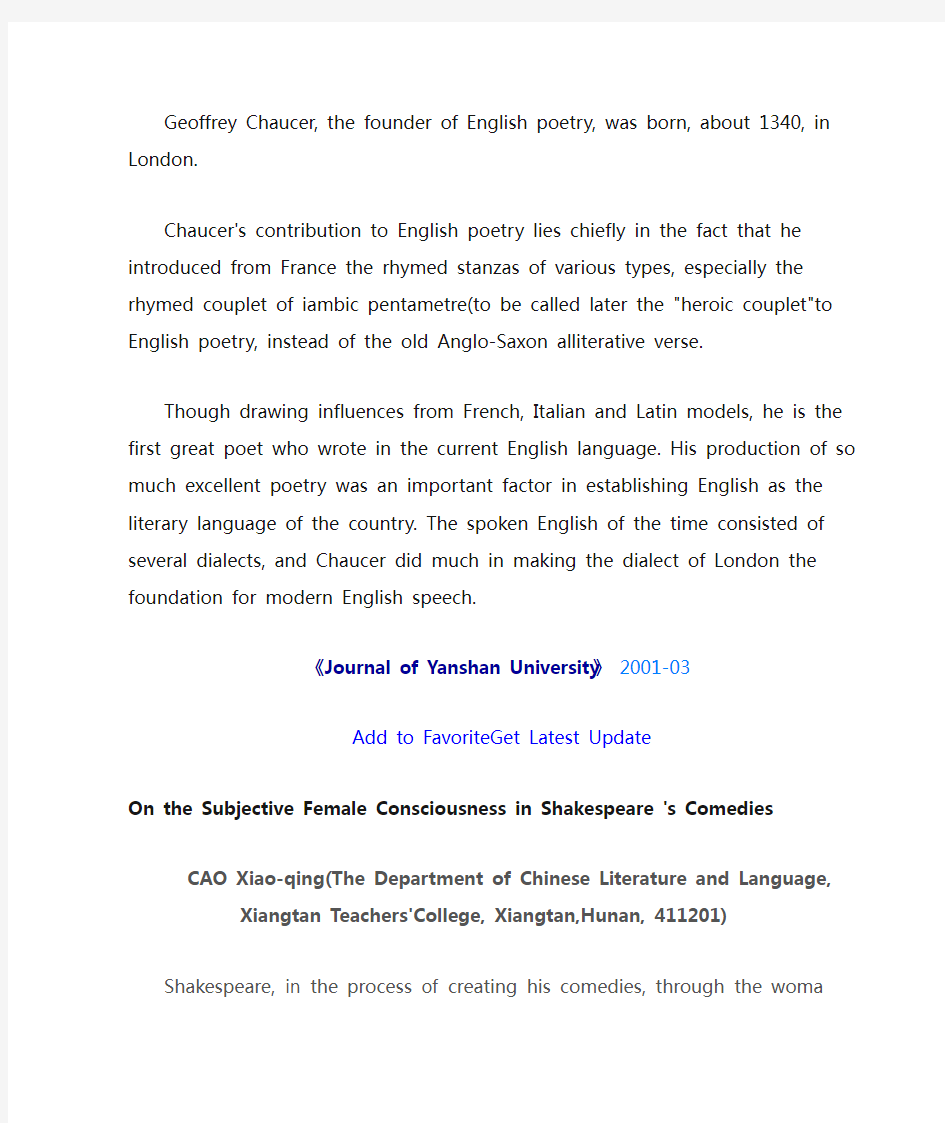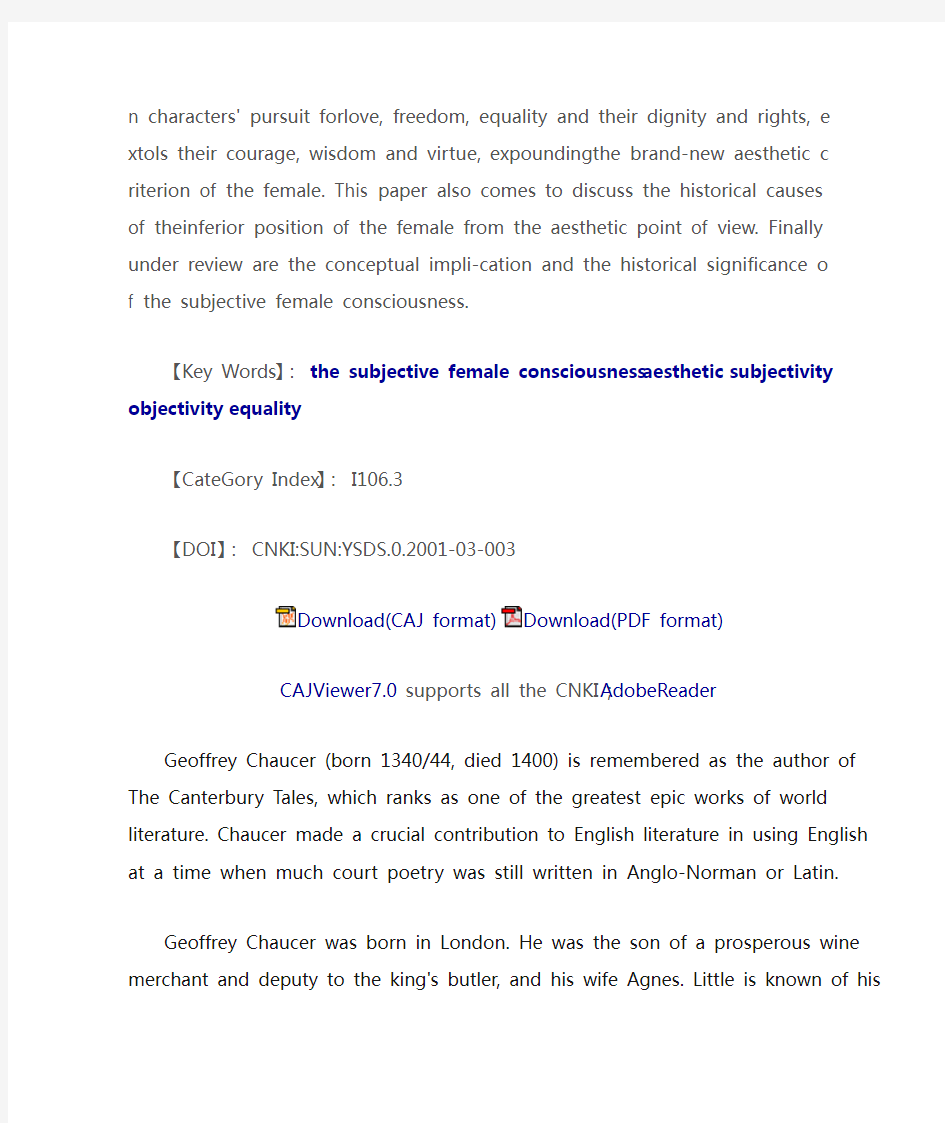Geoffrey-Chaucer


Geoffrey Chaucer, the founder of English poetry, was born, about 1340, in London.
Chaucer's contribution to English poetry lies chiefly in the fact that he introduced from France the rhymed stanzas of various types, especially the rhymed couplet of iambic pentametre(to be called later the "heroic couplet"to English poetry, instead of the old Anglo-Saxon alliterative verse.
Though drawing influences from French, Italian and Latin models, he is the first great poet who wrote in the current English language. His production of so much excellent poetry was an important factor in establishing English as the literary language of the country. The spoken English of the time consisted of several dialects, and Chaucer did much in making the dialect of London the foundation for modern English speech.
《Journal of Yanshan University》2001-03
Add to Favorite Get Latest Update
On the Subjective Female Consciousness in
Shakespeare 's Comedies
CAO Xiao-qing(The Department of Chinese Literature and Language, Xiangtan Teachers'College,
Xiangtan,Hunan, 411201)
Shakespeare, in the process of creating his comedies, through the woman characters' pursuit forlove, freedom, equality and their dignity and rights, extols their courage, wisdom and virtue, expoundingthe br and-new aesthetic criterion of the female. This paper also comes to discuss the historical causes of theinf erior position of the female from the aesthetic point of view. Finally under review are the conceptual im pli-cation and the historical significance of the subjective female consciousness.
【Key Words】:the subjective female consciousness aesthetic subjectivity objectivity equality
【CateGory Index】:I106.3
【DOI】:CNKI:SUN:YSDS.0.2001-03-003
Download(CAJ format) Download(PDF format)
CAJViewer7.0 supports all the CNKI ; AdobeReader
Geoffrey Chaucer (born 1340/44, died 1400) is remembered as the author of The Canterbury Tales, which ranks as one of the greatest epic works of world literature. Chaucer made a crucial contribution to English literature in using English at a time when much court poetry was still written in Anglo-Norman or Latin.
Geoffrey Chaucer was born in London. He was the son of a prosperous wine
merchant and deputy to the king's butler, and his wife Agnes. Little is known of his early education, but his works show that he could read French, Latin, and Italian.
In 1359-1360 Chaucer went to France with Edward III's army during the Hundred Years' War. He was captured in the Ardennes and returned to England after the treaty of Brétigny in 1360. There is no certain information of his life from 1361 until c.1366, when he perhaps married Philippa Roet, the sister of John Gaunt's future wife. Philippa died in 1387 and Chaucer enjoyed Gaunt's patronage throughout his life.
Between 1367 and 1378 Chaucer made several journeys abroad on diplomatic and commercial missions. In 1385 he lost his employment and rent-free home, and moved to Kent where he was appointed as
justice of the peace. He was also elected to Parliament. This was a period of great creativity for Chaucer, during which he produced most of his best poetry, among others Troilus and Cressida (c. 1385), based on a love story by Boccaccio.
Chaucer took his narrative inspiration for his works from several sources but still remained an entirely individual poet, gradually developing his personal style and techniques. His first narrative poem, The Book of the Duchess, was probably written shortly after the death of Blanche, Duchess of Lancaster, first wife of John Gaunt, in September 1369. His next important work, The House of Fame, was written between 1374 and 1385. Soon afterward Chaucer translated The Consolation of Philosophy by Boethius, and wrote the poem The Parliament of Birds.
Chaucer did not begin working on The Canterbury Tales until he was in his early 40s. The book, which was left unfinished when the author died, depicts a pilgrimage by some 30 people, who are going on a spring day in April to the shrine of the martyr, St. Thomas Becket. On the way they amuse themselves by telling stories. Among the band of pilgrims are a knight, a monk, a prioress, a plowman, a miller, a merchant, a clerk, and an oft-widowed wife from Bath. The stories are interlinked with interludes in which the characters talk with each other, revealing much about themselves.
According to tradition, Chaucer died in London on October 25, 1400. He was buried in Westminster Abbey, in the part of the church, which afterwards came to be called Poet's Corner. A monument was
erected to him in 1555
The drama actress Portia, the play is the most brilliant sunshine characters. She is Baer, true master, she is beautiful, smart, humble, kind, is the embodiment of humanistic thoughts. She is bold pursuit of love of life, a kinsman of the emperor celebrated Prince Prince and other suitors a contemptuous disregard, and the courage to participate in social affairs, successfully solved the problems his and Antonio's " a pound of flesh. ".
They are the conflicts of two opposite ideas, identification, convention and religions.
Bassanio although is a noble, actually he is a declining aristocrat. He has squandered his money at different meeting, gathering and on woman. Not to speak so tactful, he is a playboy who never plans to get a job or doing some business. Instead, he would like to life his head from a profitable marriage. When he borrows money from Antonio as chip to pursuing Portia. Antonio says:
I pray you, good Bassanio, let me know it;
And if it stand, as you yourself still do,
Within the eye of honour, be assured
My purse, my person, my extremest means,
Lie all unlockt to your occasion②(ActⅠsceneⅠ,P12,135-140)
And when his boats wreck on sea, he has had to obey the contract, and he says:
Sweet Bassanio, my ships have all miscarried, my creditors grow crule, my estate is very low, my bond to the Jew is forfeit; and since in paying it, it is impossible I should live, all debates are cleared between you and I. if I might but see you at my death. Notwithstanding, use your pleasure; if your love do not persuade you to come, let not my letter. ②(Act ⅢScene Ⅱ
P132,315-321)
From these words, we can confirm Antonio is the best friend of Bassanio. He always helps other not to ask for reward, even sacrifice his life. When Bassanio hears the news that Antonio will lose his life for him. He returns immediately and gives his lover’s ring back to the clerk to show his thanks. Their friendship has been proved so perfect.
Conclusion
The period that Shakespeare created the Merchant of Venice was the reign of Elizabeth Ⅰ. What was the name of that period called “the First Flowering Period of English Literature” and the greatest change began with drama. Shakespeare was the representative at that time. In his romantic comedies, Shakespeare takes an optimistic attitude toward love and youth. The Merchant of Venice, in which he has created tension, ambiguity, a self-consciousness and self-delighting artifice that, is at once intellectually exciting and emotionally engaging.
There are two comic characters exists in the Merchant of Venice. The first one is comedy united with mock. As we see, what the center place this story happened is a city full of the smell of commercialize and capitalism. Different race, identification, religion, law and some ideas about fair and unfair are all showed out. In this play, Jew Shylock performs great greed for money. When he is resulted and treated unfair, he is brewing a strongly dissatisfaction to revenge the Christian and graceful gentleman and appealing for equal treatment. In fact, Shylock’s characteristic has many as pects. He is a usurer. He is avaricious and stingy. But he also has the pity point: being lost daughter; being humiliated by Antonio; being treated unfair in Christian society, and his endless miss for his wife. All of his role action has surpassed the friendship between Antonio and Bassanio, and the propagation of Christian by Portia. So in the thesis, the author argues Shylock not only as a curt, greedy and sly person, but also as a sympathetic figure.
The second distinguishing feature is comedy united with the ideal of humanism. One critic says that Shakespeare’s comedies and romances tend to focus on daughters whose age and rank make them desirable spouses for men seeking to improve their social standing. There is no exception of
Shakespeare’s comedies t akes love as the theme. And the most used expression to describe the lover’s relationship in debate. They match with intelligent, minds and sentiments. Woman always emerges the victor. They are not only chaste, beautiful, young and more sensible
